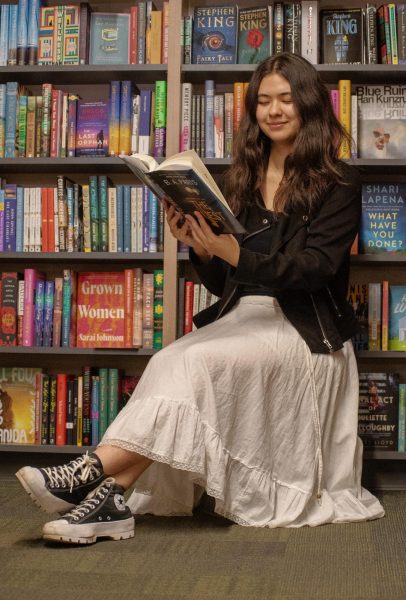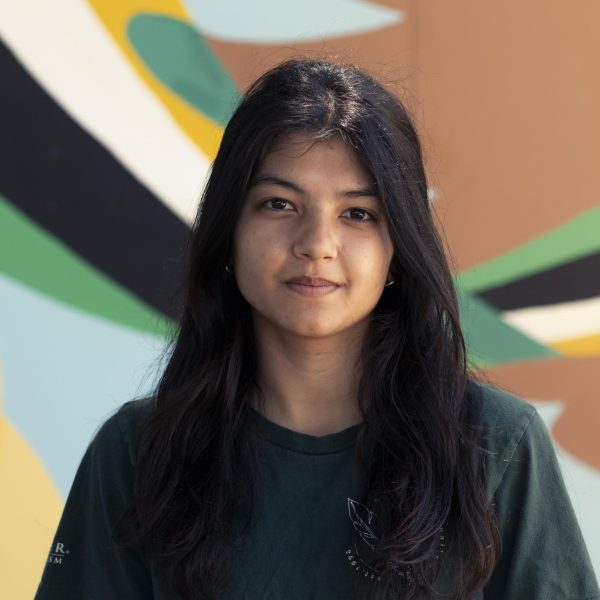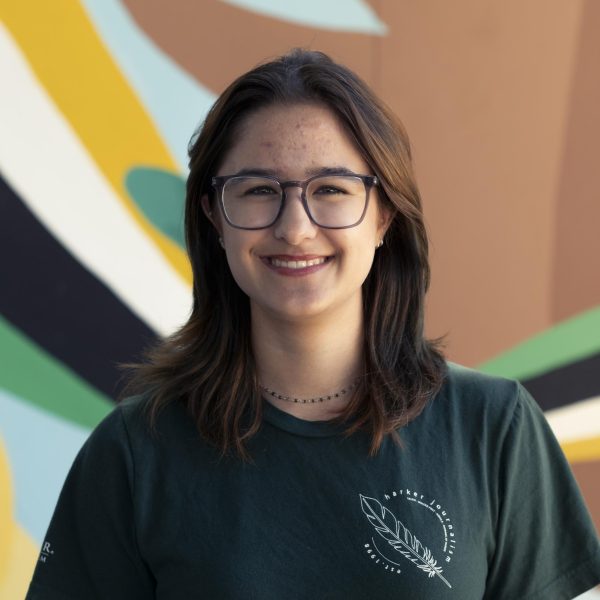
A toddler sits wide-eyed on a wooden chair, an inflatable doll looming before him. He watches in awe as an adult strides into the room and strikes the doll with sudden, forceful blows. After the adult storms out, the seemingly innocent child replicates the same aggressive act he just witnessed. In the darkened room of the University of Chicago summer program, senior Stephanie Bossolina and her classmates erupt into laughter as they watch the iconic Bobo Doll experiment projected onto the screen. As the laughter subsides, a realization settles over her: this is the community she belongs in, in a room full of curious minds captivated by the same psychological mysteries as her.
Stephanie’s exploration of psychology throughout high school traces back to a single starting point: the summer before 9th grade at UC Santa Cruz’s Science Internship Program (SIP), where she researched a phenomenon she’d experienced herself: ear worms, catchy tunes that get stuck in a listener’s head. Working closely with a mentor, she contributed to a project investigating whether those mental replays happen in the same key as the actual song, a notion that hadn’t been thoroughly researched at the time.
“I’ve always had songs stuck in my head so I thought it would be fun to research,” Stephanie said. “It happens to me so often, especially during tests, you’ll just hear a little sound go off, which can be distracting. That program really inspired me to continue and it’s how I fell in love with the field.”
Since then, Stephanie eagerly embraced the complexities of psychology through online courses introducing the field, a social psychology course in school and summer programs concentrated on child development and brain plasticity. What drives her desire to uncover the field most is the way psychology reveals itself in everyday life through human interaction and subtle influences that often go unnoticed.
“I liked how psychology applies to everyone around us, and how it’s such a human experience,” Stephanie said. “It’s like how people react to situations and how we behave around each other. We’re learning something that exists, but it’s not like math where you can formulate an answer. It’s like a mystery to us, but we’re still trying to learn it.”
Stephanie’s thorough approach to grasping psychology’s diverse branches extends to all spheres of her academic life, a reflection of both her patience and genuine love for learning. Math teacher Caren Furtado, who taught Stephanie in both Precalculus and Calculus, regards her as a highly motivated and tenacious student. Furtado highlights her methodical problem-solving and persistence in tackling challenging questions as defining traits of her success in math.
“Stephanie’s very ambitious and clear about her goals,” Furtado said. “She will definitely get what she wants because she’s so driven and quality conscious. During her free periods, she was here practicing all the time because she was so determined to do well. She clearly understands that if you’re stuck somewhere and you persevere, you’ll get to wherever you want to be. Even when she doesn’t understand something, she gives herself that time and space.”
Stephanie embraced that same relentless drive as she evolved from a novice in volleyball to a seasoned player. She picked up the sport at 11 years old, following the suit of her older sister, initially playing as a setter and later transitioning to an opposite hitter. By competing alongside many of the same teammates on both her club and school teams for years, Stephanie forged close-knit bonds that prompted her to have a more confident, outgoing personality.
“Volleyball helped me develop social skills at a young age,” Stephanie said. “You figure out what teamwork is, how to work together and how to be nice to each other, especially since you’re there for the ups and downs together. By being able to communicate with others and cheering each other on, you learn teamwork.”
Given her collaborative spirit, along with her skill in volleyball, Stephanie earned the role of team captain of the girls’ junior varsity team in her junior year and now competes at the varsity level. When she became a leader, younger team members often sought her guidance and wisdom.
“I try to form relationships with younger students because my sister was such a big influence to me,” Stephanie said. “So, I want to be that older sister for them and be someone that they could always ask questions to. I want to be someone that they can always rely on and always be there for them.”
Despite their difference in ages, Stephanie developed an especially close relationship with sophomore Riya Samuel, a freshman on the team at the time, who considers Stephanie a second sister.
“She has a natural instinct to lead everyone,” Riya said. “She was really on top of everything as a captain and was up close and personal with the freshman. We’ve all become super close to her because she was so real with us. When I was playing, she would be on the bench screaming my name. She was always super loud and supported everyone during games.”
Beyond the volleyball court, her close friends consider her just as reliable and supportive. Senior Sophia Zhu, who has remained close to Stephanie since kindergarten, commends her mindful outlook that reassures her in moments of stress and offers sanctuary to freely express her concerns without fear of judgment.
“Stephanie makes a very relaxed atmosphere and has a comforting presence for me to just converse, which expands to a variety of things,” Sophia said. “She brings such positive energy to her interactions and shows so much care for other people. Students can be so busy with school, so it’s hard to notice everything. But she’s still so sensitive to the people around her.”
Whether Stephanie’s decoding the rhythms of the mind, instilling self-assurance in a teammate or setting aside her own needs for that of her friend’s, behind Stephanie’s every move is a deep-rooted instinct to understand others. Friends, classmates, teachers and teammates alike lean on her as a dependable source of support, a role she will continue to embrace wholeheartedly.
“I hope to leave a mark on my community by being someone that people can always rely on,” Stephanie said. “It’s a human instinct that I’ve learned to want to help others and be there for others. People have been there for me when I needed support, so I constantly strive to be that person for someone else.”




![LALC Vice President of External Affairs Raeanne Li (11) explains the International Phonetic Alphabet to attendees. "We decided to have more fun topics this year instead of just talking about the same things every year so our older members can also [enjoy],” Raeanne said.](https://harkeraquila.com/wp-content/uploads/2025/10/DSC_4627-1200x795.jpg)


















![“[Building nerf blasters] became this outlet of creativity for me that hasn't been matched by anything else. The process [of] making a build complete to your desire is such a painstakingly difficult process, but I've had to learn from [the skills needed from] soldering to proper painting. There's so many different options for everything, if you think about it, it exists. The best part is [that] if it doesn't exist, you can build it yourself," Ishaan Parate said.](https://harkeraquila.com/wp-content/uploads/2022/08/DSC_8149-900x604.jpg)




![“When I came into high school, I was ready to be a follower. But DECA was a game changer for me. It helped me overcome my fear of public speaking, and it's played such a major role in who I've become today. To be able to successfully lead a chapter of 150 students, an officer team and be one of the upperclassmen I once really admired is something I'm [really] proud of,” Anvitha Tummala ('21) said.](https://harkeraquila.com/wp-content/uploads/2021/07/Screen-Shot-2021-07-25-at-9.50.05-AM-900x594.png)







![“I think getting up in the morning and having a sense of purpose [is exciting]. I think without a certain amount of drive, life is kind of obsolete and mundane, and I think having that every single day is what makes each day unique and kind of makes life exciting,” Neymika Jain (12) said.](https://harkeraquila.com/wp-content/uploads/2017/06/Screen-Shot-2017-06-03-at-4.54.16-PM.png)








![“My slogan is ‘slow feet, don’t eat, and I’m hungry.’ You need to run fast to get where you are–you aren't going to get those championships if you aren't fast,” Angel Cervantes (12) said. “I want to do well in school on my tests and in track and win championships for my team. I live by that, [and] I can do that anywhere: in the classroom or on the field.”](https://harkeraquila.com/wp-content/uploads/2018/06/DSC5146-900x601.jpg)
![“[Volleyball has] taught me how to fall correctly, and another thing it taught is that you don’t have to be the best at something to be good at it. If you just hit the ball in a smart way, then it still scores points and you’re good at it. You could be a background player and still make a much bigger impact on the team than you would think,” Anya Gert (’20) said.](https://harkeraquila.com/wp-content/uploads/2020/06/AnnaGert_JinTuan_HoHPhotoEdited-600x900.jpeg)

![“I'm not nearly there yet, but [my confidence has] definitely been getting better since I was pretty shy and timid coming into Harker my freshman year. I know that there's a lot of people that are really confident in what they do, and I really admire them. Everyone's so driven and that has really pushed me to kind of try to find my own place in high school and be more confident,” Alyssa Huang (’20) said.](https://harkeraquila.com/wp-content/uploads/2020/06/AlyssaHuang_EmilyChen_HoHPhoto-900x749.jpeg)




